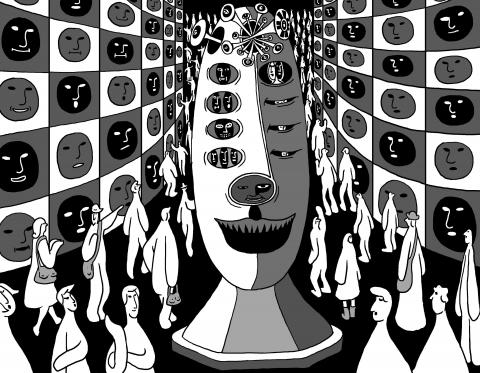Detroit police have over the past two years been quietly utilizing controversial and unreliable facial recognition technology to make arrests in the city.
The news, revealed in May in a Georgetown University report, has shocked many Detroiters and sparked a public debate in the city that is still raging and mirrors similar battles playing out elsewhere in the US and across the world.
Among other issues, critics in the majority-black city point out that flawed facial recognition software misidentifies people of color and women at much higher rates.

Illustration: Mountain People
Detroit also has the capability to use the technology to monitor residents in real time, although Detroit’s police chief claims that it would not.
Willie Burton, a black member of the civilian Detroit Police Commission that oversees the department, said that Detroit’s population is 83 percent black, which makes using the technology especially worrying.
“This should be the last place that police use the technology because it can’t identify one black man or woman from another,” he said. “Every black man with a beard looks alike to it. Every black man with a hoodie looks alike. This is techno-racism.”
At a July meeting on the issue held by the police commission, arguments got so heated over facial recognition that officers arrested and temporarily jailed Burton as he loudly objected to its use.
The technology presents obvious questions over whether police are violating residents’ privacy protections.
Detroit’s facial recognition software makes it much easier for the city to track people’s movements across time, while efficiently and secretly gathering personal information, said Clare Garvie, an author of the report from the Georgetown Law Center on Privacy and Technology.
“It can betray information about sensitive locations — who someone is as a person, if they’re going to church, an HIV clinic — and the [US] Supreme Court has said we have a right to privacy even if we are in public,” she said.
Garvie conservatively estimates that a quarter of the nation’s 18,000 police agencies use facial recognition technology, and that more than half of American adults’ photographs are available for investigation.
Chicago runs a similar program as that in Detroit, while the Los Angeles Police Department might be operating a small number of cameras that track the public in real time.
Some local governments are proposing regulations to limit it.
San Francisco and Oakland in California and Cambridge and Sommerville in Massachusetts have recently banned the technology. Florida’s Orlando scrapped a pilot real-time surveillance program after the software proved to be unreliable, and New York Governor Andrew Cuomo is attempting to implement facial recognition software in New York City, but without success so far.
At the federal level, the US Congress in May held hearings on the issue.
US Representative Rashida Tlaib, whose district includes parts of Detroit, has introduced legislation that would prohibit its use at public housing.
“Policing our communities has become more militarized and flawed,” Tlaib said during the May 22 hearing. “Now we have for-profit companies pushing so-called technology that has never been tested in communities of color, let alone been studied enough to conclude that it makes our communities safer.”
However, facial recognition software is just the latest in Detroit’s development of a comprehensive public surveillance apparatus that includes multiple camera programs.
As part of its Project Green Light, the city installed nearly 600 high-definition cameras at intersections, schools, churches, public parks, immigration centers, addiction treatment centers, apartment buildings, fast food restaurants and other businesses around the city.
Police pull still images from those and thousands of other private cameras, then use facial recognition software to cross-reference them with millions of photographs pulled from a mugshot database, driver’s license photographs and images culled from social media.
For example, were Detroit to start using the software in real time, it could continually scan those entering any location covered by its cameras, or motorists and pedestrians traveling through an intersection.
Although there is no oversight, Detroit Police Chief James Craig insists that the department would not use real-time software and only runs still images as an “investigative tool” for violent crimes.
Police have said that any match requires “sufficient corroboration” before an arrest can be made.
However, Garvie said that the software has led to false arrests elsewhere in the country.
Facial recognition technology’s premise “flips on its head” the idea of innocent until proven guilty, Garvie said at a recent Detroit forum on the topic.
“Biometrically identifying everyone and checking them against a watch list or their criminal history assumes they’re guilty until they prove they’re innocent by not having a record,” she said. “That’s not going to make us more secure. It’s going to make us more afraid.”
A Detroit police spokesperson could not say how many arrests had involved the technology, although Craig said that no false arrests have been made.
Craig acknowledged issues with accuracy, but stressed that matches are treated as a lead and go through a rigorous review process.
“Facial recognition is only part of methodical investigation to identify and confirm that the suspect is involved in that crime,” he said.
Some residents have said that the technology is sowing more distrust in Detroit and civil rights advocates accuse the city of intentionally muddying the waters.
Georgetown University’s report said that police did not mention on the Green Light Web site that cameras would be used with facial recognition software, and property owners who installed them were not made aware of it.
“There’s been no transparency and we won’t stand for it,” Burton said. “We don’t want it here, and we are going to fight back because we deserve better.”
A series of strong earthquakes in Hualien County not only caused severe damage in Taiwan, but also revealed that China’s power has permeated everywhere. A Taiwanese woman posted on the Internet that she found clips of the earthquake — which were recorded by the security camera in her home — on the Chinese social media platform Xiaohongshu. It is spine-chilling that the problem might be because the security camera was manufactured in China. China has widely collected information, infringed upon public privacy and raised information security threats through various social media platforms, as well as telecommunication and security equipment. Several former TikTok employees revealed

For the incoming Administration of President-elect William Lai (賴清德), successfully deterring a Chinese Communist Party (CCP) attack or invasion of democratic Taiwan over his four-year term would be a clear victory. But it could also be a curse, because during those four years the CCP’s People’s Liberation Army (PLA) will grow far stronger. As such, increased vigilance in Washington and Taipei will be needed to ensure that already multiplying CCP threat trends don’t overwhelm Taiwan, the United States, and their democratic allies. One CCP attempt to overwhelm was announced on April 19, 2024, namely that the PLA had erred in combining major missions
The Constitutional Court on Tuesday last week held a debate over the constitutionality of the death penalty. The issue of the retention or abolition of the death penalty often involves the conceptual aspects of social values and even religious philosophies. As it is written in The Federalist Papers by Alexander Hamilton, James Madison and John Jay, the government’s policy is often a choice between the lesser of two evils or the greater of two goods, and it is impossible to be perfect. Today’s controversy over the retention or abolition of the death penalty can be viewed in the same way. UNACCEPTABLE Viewing the
At the same time as more than 30 military aircraft were detected near Taiwan — one of the highest daily incursions this year — with some flying as close as 37 nautical miles (69kms) from the northern city of Keelung, China announced a limited and selected relaxation of restrictions on Taiwanese agricultural exports and tourism, upon receiving a Chinese Nationalist Party (KMT) delegation led by KMT legislative caucus whip Fu Kun-chi (傅崑萁). This demonstrates the two-faced gimmick of China’s “united front” strategy. Despite the strongest earthquake to hit the nation in 25 years striking Hualien on April 3, which caused